RMIT BUSM4688: Reflective Essay on Intercultural Effectiveness
VerifiedAdded on 2023/01/04
|5
|1314
|52
Essay
AI Summary
This essay is a reflective analysis of a student's intercultural effectiveness, particularly focusing on the weakness of cultural insensitivity in a cross-cultural management context. The student identifies a lack of knowledge, awareness, and acceptance of cultural differences as key contributors to this weakness, leading to projected cognitive similarity and biased perceptions. The essay then outlines a personal development plan, informed by cultural intelligence theory, to enhance cultural sensitivity. This plan involves acquiring knowledge about diverse cultures through reading and engagement in intercultural discussions. The action plan focuses on developing the heart (motivation and confidence), the head (knowledge and strategies), and the body (behavior) components of cultural intelligence to improve interactions in multicultural environments. References to relevant literature support the analysis and proposed actions.
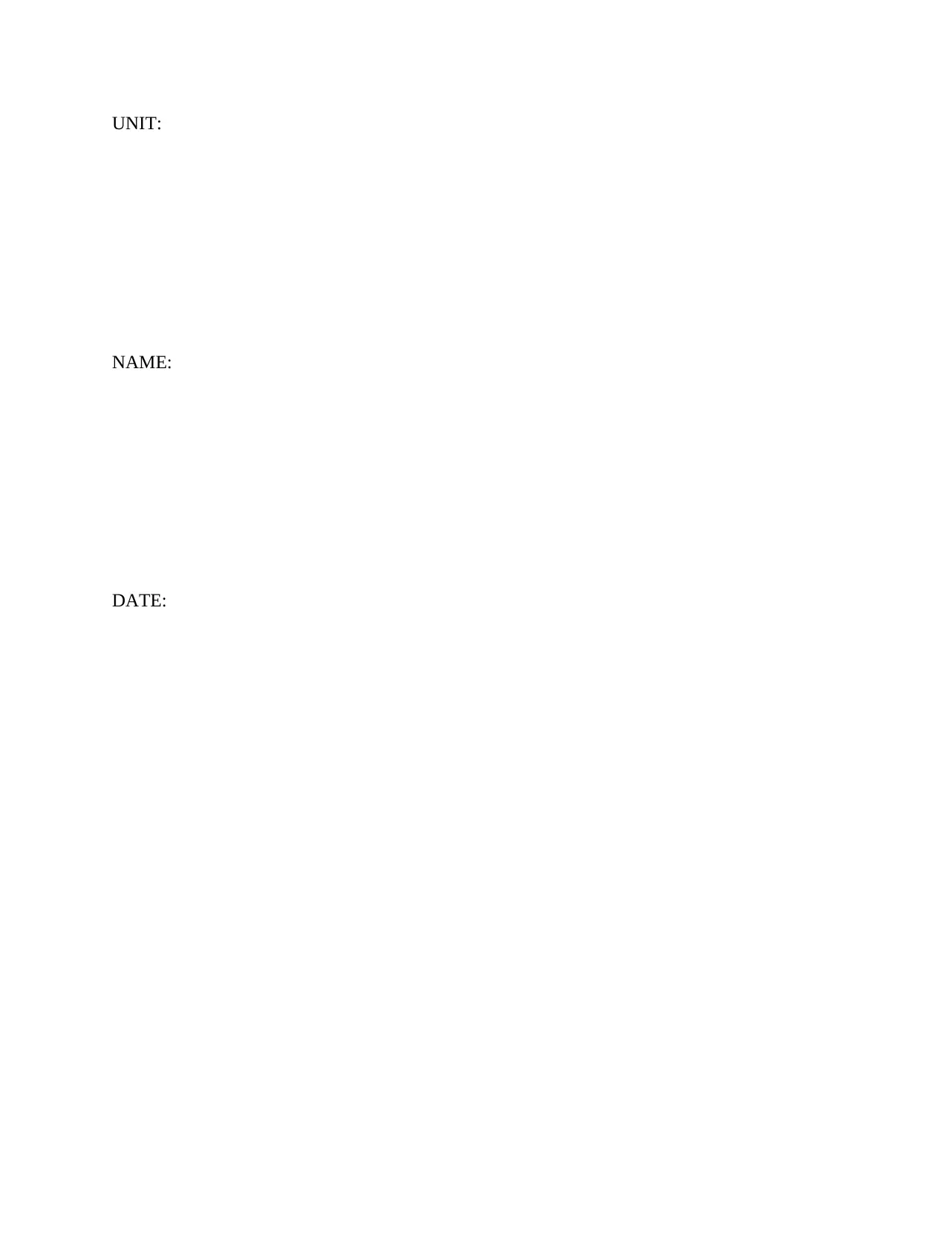
UNIT:
NAME:
DATE:
NAME:
DATE:
Paraphrase This Document
Need a fresh take? Get an instant paraphrase of this document with our AI Paraphraser
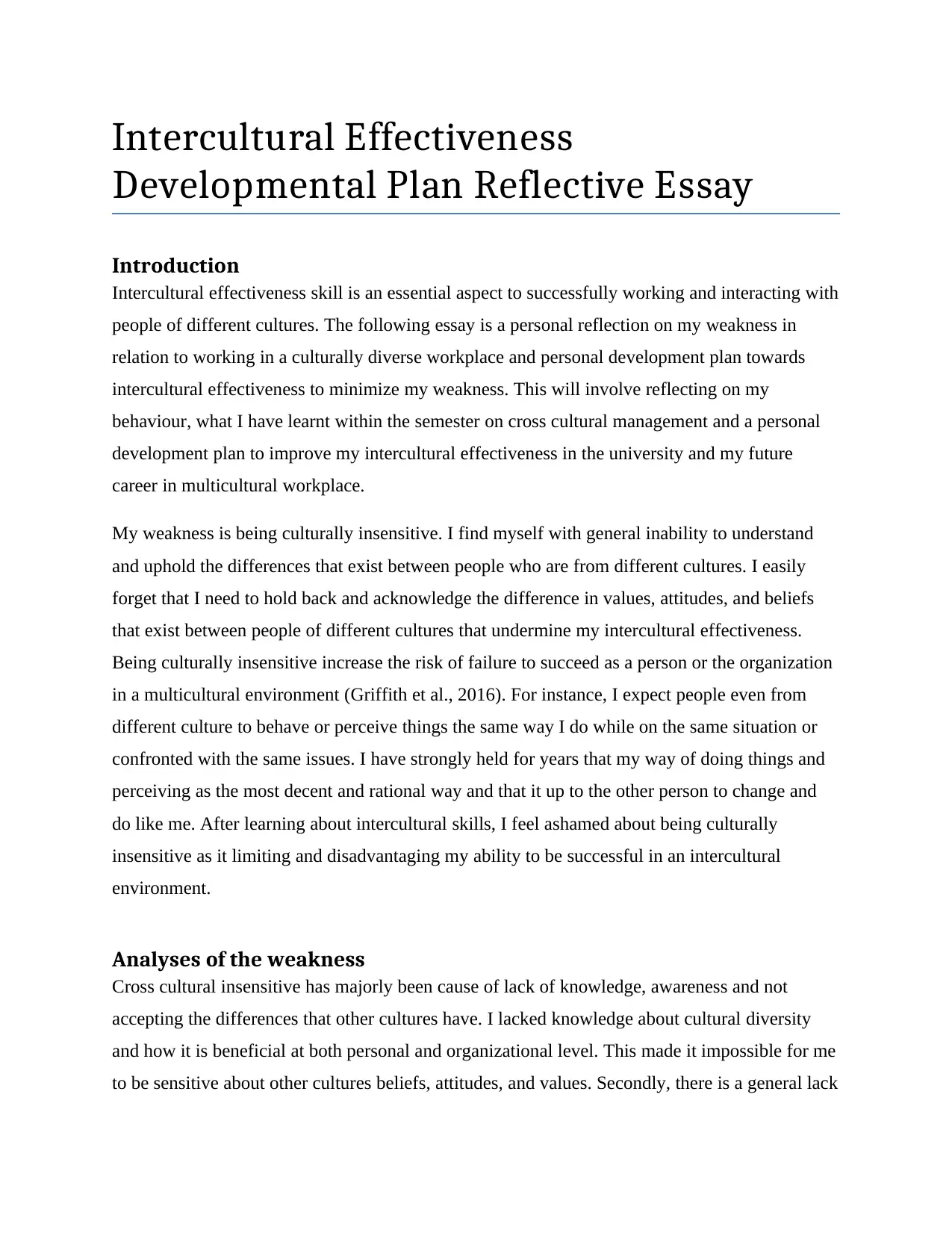
Intercultural Effectiveness
Developmental Plan Reflective Essay
Introduction
Intercultural effectiveness skill is an essential aspect to successfully working and interacting with
people of different cultures. The following essay is a personal reflection on my weakness in
relation to working in a culturally diverse workplace and personal development plan towards
intercultural effectiveness to minimize my weakness. This will involve reflecting on my
behaviour, what I have learnt within the semester on cross cultural management and a personal
development plan to improve my intercultural effectiveness in the university and my future
career in multicultural workplace.
My weakness is being culturally insensitive. I find myself with general inability to understand
and uphold the differences that exist between people who are from different cultures. I easily
forget that I need to hold back and acknowledge the difference in values, attitudes, and beliefs
that exist between people of different cultures that undermine my intercultural effectiveness.
Being culturally insensitive increase the risk of failure to succeed as a person or the organization
in a multicultural environment (Griffith et al., 2016). For instance, I expect people even from
different culture to behave or perceive things the same way I do while on the same situation or
confronted with the same issues. I have strongly held for years that my way of doing things and
perceiving as the most decent and rational way and that it up to the other person to change and
do like me. After learning about intercultural skills, I feel ashamed about being culturally
insensitive as it limiting and disadvantaging my ability to be successful in an intercultural
environment.
Analyses of the weakness
Cross cultural insensitive has majorly been cause of lack of knowledge, awareness and not
accepting the differences that other cultures have. I lacked knowledge about cultural diversity
and how it is beneficial at both personal and organizational level. This made it impossible for me
to be sensitive about other cultures beliefs, attitudes, and values. Secondly, there is a general lack
Developmental Plan Reflective Essay
Introduction
Intercultural effectiveness skill is an essential aspect to successfully working and interacting with
people of different cultures. The following essay is a personal reflection on my weakness in
relation to working in a culturally diverse workplace and personal development plan towards
intercultural effectiveness to minimize my weakness. This will involve reflecting on my
behaviour, what I have learnt within the semester on cross cultural management and a personal
development plan to improve my intercultural effectiveness in the university and my future
career in multicultural workplace.
My weakness is being culturally insensitive. I find myself with general inability to understand
and uphold the differences that exist between people who are from different cultures. I easily
forget that I need to hold back and acknowledge the difference in values, attitudes, and beliefs
that exist between people of different cultures that undermine my intercultural effectiveness.
Being culturally insensitive increase the risk of failure to succeed as a person or the organization
in a multicultural environment (Griffith et al., 2016). For instance, I expect people even from
different culture to behave or perceive things the same way I do while on the same situation or
confronted with the same issues. I have strongly held for years that my way of doing things and
perceiving as the most decent and rational way and that it up to the other person to change and
do like me. After learning about intercultural skills, I feel ashamed about being culturally
insensitive as it limiting and disadvantaging my ability to be successful in an intercultural
environment.
Analyses of the weakness
Cross cultural insensitive has majorly been cause of lack of knowledge, awareness and not
accepting the differences that other cultures have. I lacked knowledge about cultural diversity
and how it is beneficial at both personal and organizational level. This made it impossible for me
to be sensitive about other cultures beliefs, attitudes, and values. Secondly, there is a general lack
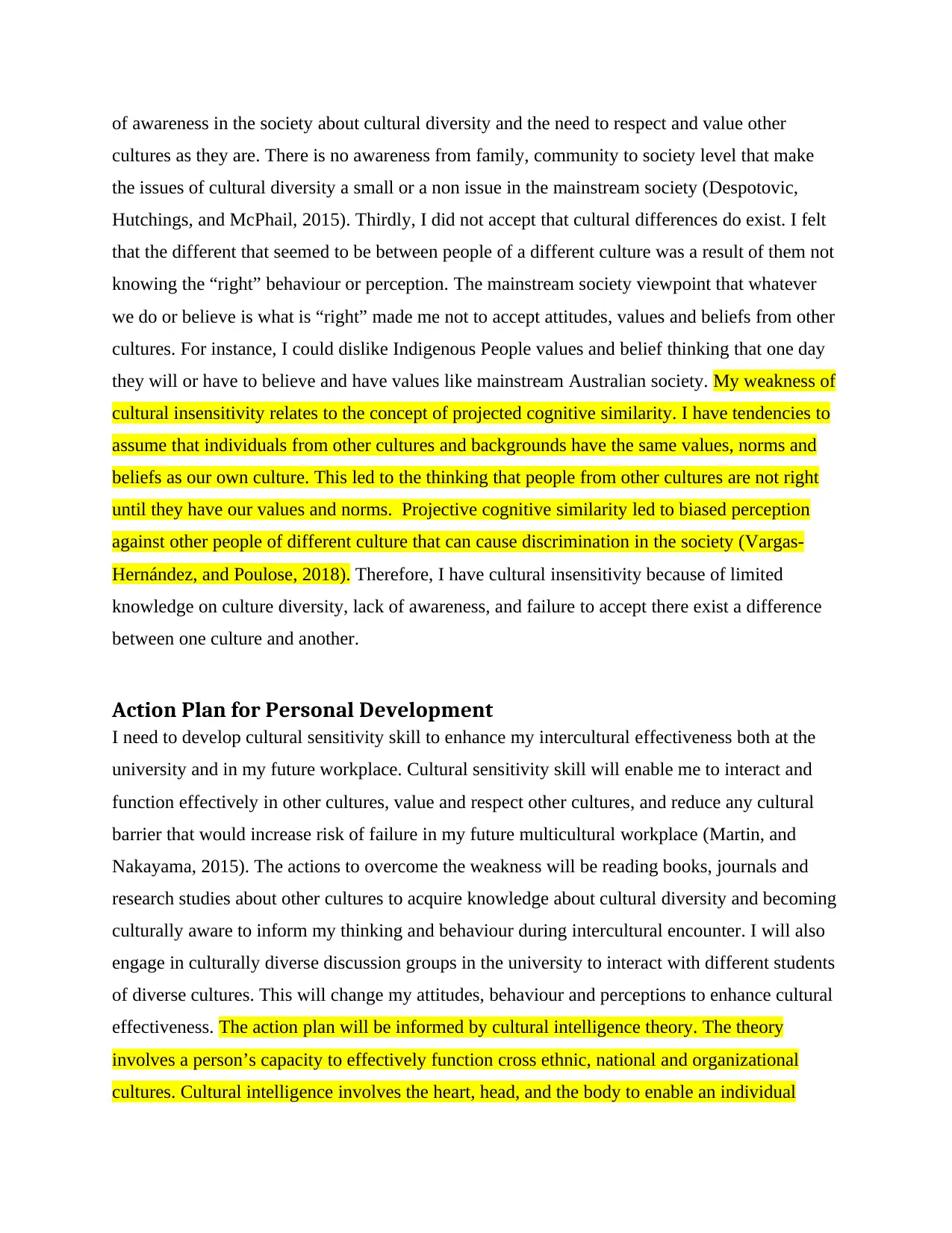
of awareness in the society about cultural diversity and the need to respect and value other
cultures as they are. There is no awareness from family, community to society level that make
the issues of cultural diversity a small or a non issue in the mainstream society (Despotovic,
Hutchings, and McPhail, 2015). Thirdly, I did not accept that cultural differences do exist. I felt
that the different that seemed to be between people of a different culture was a result of them not
knowing the “right” behaviour or perception. The mainstream society viewpoint that whatever
we do or believe is what is “right” made me not to accept attitudes, values and beliefs from other
cultures. For instance, I could dislike Indigenous People values and belief thinking that one day
they will or have to believe and have values like mainstream Australian society. My weakness of
cultural insensitivity relates to the concept of projected cognitive similarity. I have tendencies to
assume that individuals from other cultures and backgrounds have the same values, norms and
beliefs as our own culture. This led to the thinking that people from other cultures are not right
until they have our values and norms. Projective cognitive similarity led to biased perception
against other people of different culture that can cause discrimination in the society (Vargas-
Hernández, and Poulose, 2018). Therefore, I have cultural insensitivity because of limited
knowledge on culture diversity, lack of awareness, and failure to accept there exist a difference
between one culture and another.
Action Plan for Personal Development
I need to develop cultural sensitivity skill to enhance my intercultural effectiveness both at the
university and in my future workplace. Cultural sensitivity skill will enable me to interact and
function effectively in other cultures, value and respect other cultures, and reduce any cultural
barrier that would increase risk of failure in my future multicultural workplace (Martin, and
Nakayama, 2015). The actions to overcome the weakness will be reading books, journals and
research studies about other cultures to acquire knowledge about cultural diversity and becoming
culturally aware to inform my thinking and behaviour during intercultural encounter. I will also
engage in culturally diverse discussion groups in the university to interact with different students
of diverse cultures. This will change my attitudes, behaviour and perceptions to enhance cultural
effectiveness. The action plan will be informed by cultural intelligence theory. The theory
involves a person’s capacity to effectively function cross ethnic, national and organizational
cultures. Cultural intelligence involves the heart, head, and the body to enable an individual
cultures as they are. There is no awareness from family, community to society level that make
the issues of cultural diversity a small or a non issue in the mainstream society (Despotovic,
Hutchings, and McPhail, 2015). Thirdly, I did not accept that cultural differences do exist. I felt
that the different that seemed to be between people of a different culture was a result of them not
knowing the “right” behaviour or perception. The mainstream society viewpoint that whatever
we do or believe is what is “right” made me not to accept attitudes, values and beliefs from other
cultures. For instance, I could dislike Indigenous People values and belief thinking that one day
they will or have to believe and have values like mainstream Australian society. My weakness of
cultural insensitivity relates to the concept of projected cognitive similarity. I have tendencies to
assume that individuals from other cultures and backgrounds have the same values, norms and
beliefs as our own culture. This led to the thinking that people from other cultures are not right
until they have our values and norms. Projective cognitive similarity led to biased perception
against other people of different culture that can cause discrimination in the society (Vargas-
Hernández, and Poulose, 2018). Therefore, I have cultural insensitivity because of limited
knowledge on culture diversity, lack of awareness, and failure to accept there exist a difference
between one culture and another.
Action Plan for Personal Development
I need to develop cultural sensitivity skill to enhance my intercultural effectiveness both at the
university and in my future workplace. Cultural sensitivity skill will enable me to interact and
function effectively in other cultures, value and respect other cultures, and reduce any cultural
barrier that would increase risk of failure in my future multicultural workplace (Martin, and
Nakayama, 2015). The actions to overcome the weakness will be reading books, journals and
research studies about other cultures to acquire knowledge about cultural diversity and becoming
culturally aware to inform my thinking and behaviour during intercultural encounter. I will also
engage in culturally diverse discussion groups in the university to interact with different students
of diverse cultures. This will change my attitudes, behaviour and perceptions to enhance cultural
effectiveness. The action plan will be informed by cultural intelligence theory. The theory
involves a person’s capacity to effectively function cross ethnic, national and organizational
cultures. Cultural intelligence involves the heart, head, and the body to enable an individual
⊘ This is a preview!⊘
Do you want full access?
Subscribe today to unlock all pages.

Trusted by 1+ million students worldwide
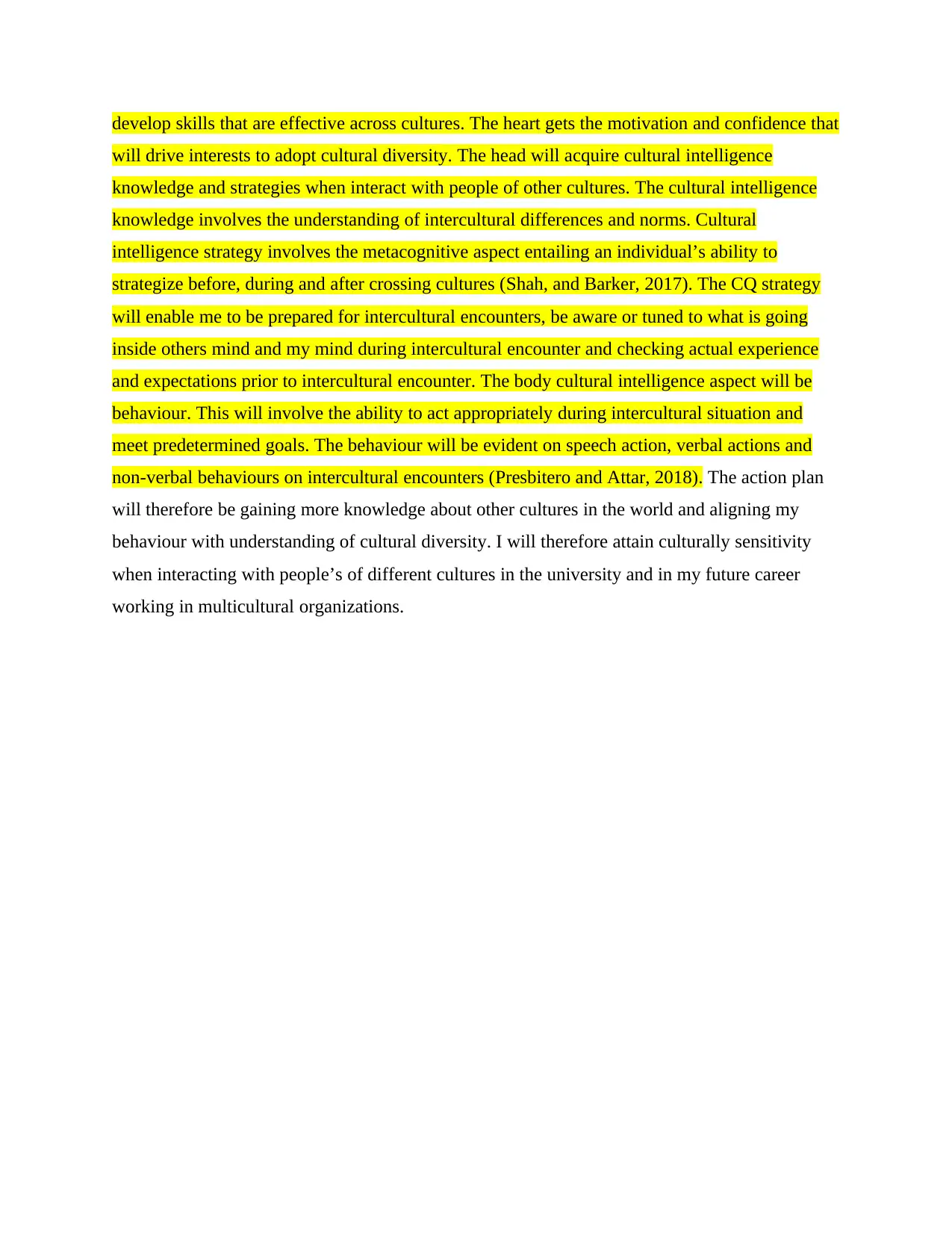
develop skills that are effective across cultures. The heart gets the motivation and confidence that
will drive interests to adopt cultural diversity. The head will acquire cultural intelligence
knowledge and strategies when interact with people of other cultures. The cultural intelligence
knowledge involves the understanding of intercultural differences and norms. Cultural
intelligence strategy involves the metacognitive aspect entailing an individual’s ability to
strategize before, during and after crossing cultures (Shah, and Barker, 2017). The CQ strategy
will enable me to be prepared for intercultural encounters, be aware or tuned to what is going
inside others mind and my mind during intercultural encounter and checking actual experience
and expectations prior to intercultural encounter. The body cultural intelligence aspect will be
behaviour. This will involve the ability to act appropriately during intercultural situation and
meet predetermined goals. The behaviour will be evident on speech action, verbal actions and
non-verbal behaviours on intercultural encounters (Presbitero and Attar, 2018). The action plan
will therefore be gaining more knowledge about other cultures in the world and aligning my
behaviour with understanding of cultural diversity. I will therefore attain culturally sensitivity
when interacting with people’s of different cultures in the university and in my future career
working in multicultural organizations.
will drive interests to adopt cultural diversity. The head will acquire cultural intelligence
knowledge and strategies when interact with people of other cultures. The cultural intelligence
knowledge involves the understanding of intercultural differences and norms. Cultural
intelligence strategy involves the metacognitive aspect entailing an individual’s ability to
strategize before, during and after crossing cultures (Shah, and Barker, 2017). The CQ strategy
will enable me to be prepared for intercultural encounters, be aware or tuned to what is going
inside others mind and my mind during intercultural encounter and checking actual experience
and expectations prior to intercultural encounter. The body cultural intelligence aspect will be
behaviour. This will involve the ability to act appropriately during intercultural situation and
meet predetermined goals. The behaviour will be evident on speech action, verbal actions and
non-verbal behaviours on intercultural encounters (Presbitero and Attar, 2018). The action plan
will therefore be gaining more knowledge about other cultures in the world and aligning my
behaviour with understanding of cultural diversity. I will therefore attain culturally sensitivity
when interacting with people’s of different cultures in the university and in my future career
working in multicultural organizations.
Paraphrase This Document
Need a fresh take? Get an instant paraphrase of this document with our AI Paraphraser
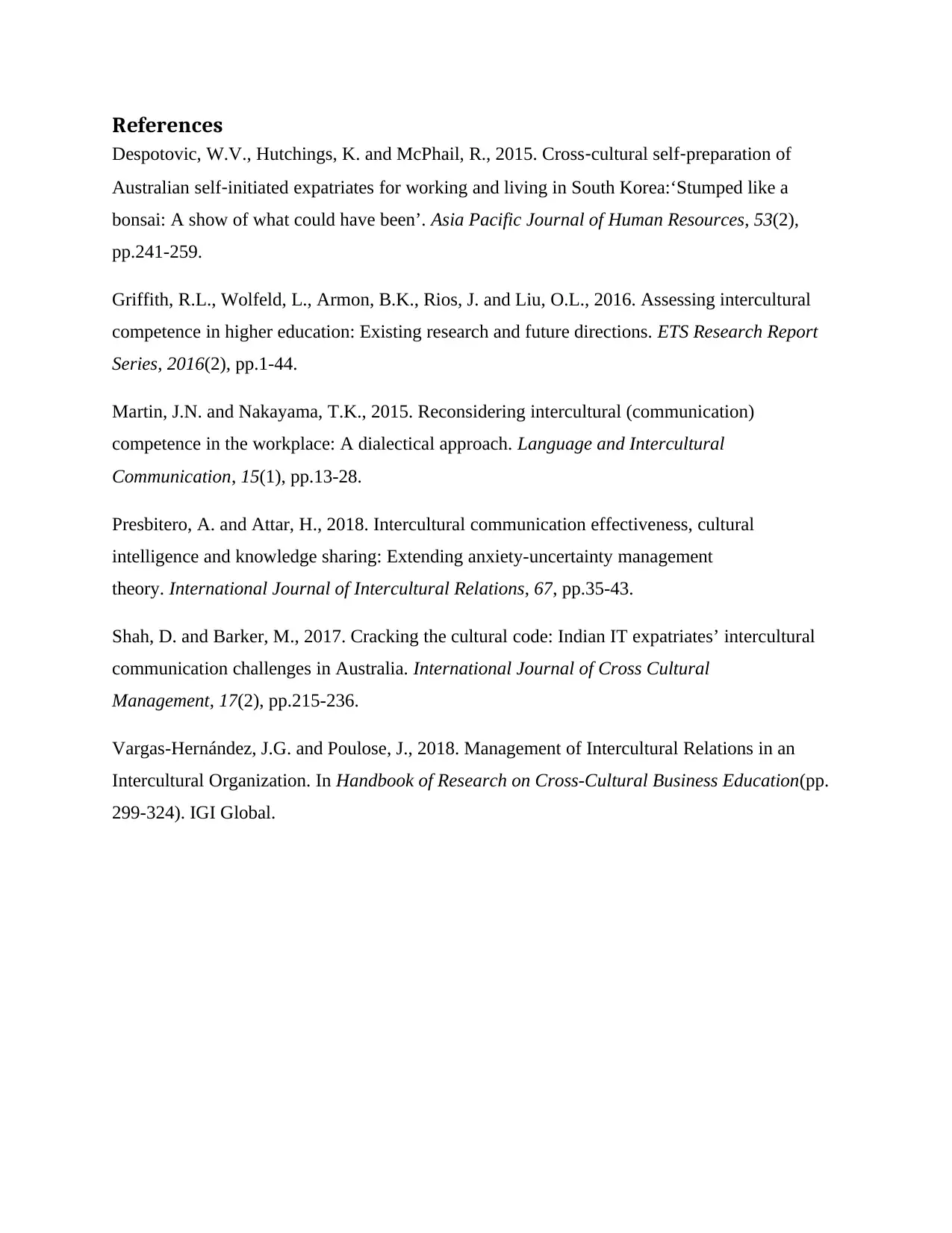
References
Despotovic, W.V., Hutchings, K. and McPhail, R., 2015. Cross‐cultural self‐preparation of
Australian self‐initiated expatriates for working and living in South Korea:‘Stumped like a
bonsai: A show of what could have been’. Asia Pacific Journal of Human Resources, 53(2),
pp.241-259.
Griffith, R.L., Wolfeld, L., Armon, B.K., Rios, J. and Liu, O.L., 2016. Assessing intercultural
competence in higher education: Existing research and future directions. ETS Research Report
Series, 2016(2), pp.1-44.
Martin, J.N. and Nakayama, T.K., 2015. Reconsidering intercultural (communication)
competence in the workplace: A dialectical approach. Language and Intercultural
Communication, 15(1), pp.13-28.
Presbitero, A. and Attar, H., 2018. Intercultural communication effectiveness, cultural
intelligence and knowledge sharing: Extending anxiety-uncertainty management
theory. International Journal of Intercultural Relations, 67, pp.35-43.
Shah, D. and Barker, M., 2017. Cracking the cultural code: Indian IT expatriates’ intercultural
communication challenges in Australia. International Journal of Cross Cultural
Management, 17(2), pp.215-236.
Vargas-Hernández, J.G. and Poulose, J., 2018. Management of Intercultural Relations in an
Intercultural Organization. In Handbook of Research on Cross-Cultural Business Education(pp.
299-324). IGI Global.
Despotovic, W.V., Hutchings, K. and McPhail, R., 2015. Cross‐cultural self‐preparation of
Australian self‐initiated expatriates for working and living in South Korea:‘Stumped like a
bonsai: A show of what could have been’. Asia Pacific Journal of Human Resources, 53(2),
pp.241-259.
Griffith, R.L., Wolfeld, L., Armon, B.K., Rios, J. and Liu, O.L., 2016. Assessing intercultural
competence in higher education: Existing research and future directions. ETS Research Report
Series, 2016(2), pp.1-44.
Martin, J.N. and Nakayama, T.K., 2015. Reconsidering intercultural (communication)
competence in the workplace: A dialectical approach. Language and Intercultural
Communication, 15(1), pp.13-28.
Presbitero, A. and Attar, H., 2018. Intercultural communication effectiveness, cultural
intelligence and knowledge sharing: Extending anxiety-uncertainty management
theory. International Journal of Intercultural Relations, 67, pp.35-43.
Shah, D. and Barker, M., 2017. Cracking the cultural code: Indian IT expatriates’ intercultural
communication challenges in Australia. International Journal of Cross Cultural
Management, 17(2), pp.215-236.
Vargas-Hernández, J.G. and Poulose, J., 2018. Management of Intercultural Relations in an
Intercultural Organization. In Handbook of Research on Cross-Cultural Business Education(pp.
299-324). IGI Global.
1 out of 5
Related Documents
Your All-in-One AI-Powered Toolkit for Academic Success.
+13062052269
info@desklib.com
Available 24*7 on WhatsApp / Email
![[object Object]](/_next/static/media/star-bottom.7253800d.svg)
Unlock your academic potential
Copyright © 2020–2026 A2Z Services. All Rights Reserved. Developed and managed by ZUCOL.





